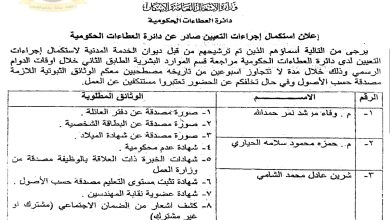Consultancy Recruitment – Nutrition Supply Budgeting Consultancy (Sudan, Libya and Egypt) – MENARO-60 working days (Remote)

UNICEF works in some of the world’s toughest places, to reach the world’s most disadvantaged children. To save their lives. To defend their rights. To help them fulfill their potential.
Across 190 countries and territories, we work for every child, everywhere, every day, to build a better world for everyone.
And we never give up.
For every child, Hope
The MENA region consists of low- middle and high-income countries that are facing a double or triple burden of malnutrition (i.e. stunting, wasting, micronutrient deficiencies, overweight and obesity) and the associated chronic, non-communicable diseases (NCDs). The nutrition situation of children across MENA reveals inequities in the nutrition status of children under five between and within countries. Additionally, the region has been inundated with ongoing conflicts for many years, further affecting the nutrition status of the most vulnerable population, women and children. The effects of persistent conflict in MENA are not limited to death and injuries. Still, they include secondary in-direct consequences such as the deterioration of social, economic, and health conditions, both in conflict-affected and neighbouring countries. The triple burden of undernutrition, micronutrient deficiencies, and overweight/obesity is accelerating in the region. Approximately 1 in 5 are stunted (5 countries >30%). Wasting rates are above the emergency threshold, and GAM rate is above 15% in some areas in Yemen, Sudan and Djibouti. Moreover, 11% of children under five are overweight in the region. 1 in 3 women in the region is anaemic and nutritionally at risk. These women have higher chances of delivering a low-birth-weight baby and dying during childbirth Nutrition interventions vary between conflict and non-conflict countries as the former appears to have interventions focused on the treatment of acute malnutrition and saving lives. Moreover, these countries undergo broader sub-national inequity, especially within wealth quintiles. In conflict and fragile contexts with high burdens of malnutrition such as Yemen, Syria, Sudan, Libya and Djibouti & the high numbers of malnourished children like the case in Egypt, the procurement of nutrition supplies is being done by UNICEF and is highly dependent on external donor support. In some non-conflict countries, the governments do the procurement of selected nutrition supplies (sometimes through UNICEF procurement services, e.g. Egypt). Mapping nutrition supplies procurements and forecasting is therefore critical, and the development of advocacy for government increasing financing for nutrition supplies is highly needed for sustainability.
How can you make a difference?
One of the key objectives is to build the capacity of the UNICEF country teams and government systems in nutrition supplies procurement planning/forecasting. In line with that, UNICEF is currently looking for a contractor who will map the nutrition supply procurement budgeting process in three MENA countries (Sudan, Libya and Egypt) to identify challenges and required support in addressing them, develop the multi- year nutrition commodities procurement forecast, build capacity of the country teams as well as develop advocacy messages to support resource mobilization efforts for increased allocation to nutrition programme.
Scope of Work:
Under the supervision of the Regional Nutrition Adviser, UNICEF MENARO and Regional Chief of Supply, UNICEF MENARO, and with technical guidance of PF4C Lead from MENARO and UNICEF Supply Division, the contractor will be responsible for the following:
1.Develop a draft Inception report layout
The Inception report must articulate the proposed methodology and proposes a detailed timeline and stakeholder consultations.
2.Map the Nutrition Commodities Procurement Budgeting Process, including key actors and decision- makers for UNICEF and government, to identify current operational issues and challenges in forecasting, quantification and costing of procurement needs, as well as cash flow timing issues, and propose solutions to address them, including:
- Map the Nutrition Commodities Procurement Budgeting Process to identify challenges in forecasting, quantification, costing, and integrating procurement needs into the national supply chain system (including developing budgeting templates and methodology if necessary).
- Identify line-item funds allocated for nutrition needs and cash flow timing issues, as well as track trends in funding using retrospective budget data.
- Propose solutions to address the above issues, including considering existing analyses and recommendations.
3.Review and as appropriate, support revision of the forecast and consequent funding needs for the 2023-2027 procurement of nutrition commodities, including review of funding allocations to nutrition commodities procurement and management in the next year’s budget / MTEF, including:
- Review and as appropriate, support revision of the forecast and consequent funding needs for the 2023-2027 procurement of nutrition commodities, including review of funding allocations to nutrition commodities procurement in the next year’s budget / MTEF
- Explore opportunities of integration of nutrition supplies procurements on the list of the essential medicine that are procured by the government
- If necessary, develop a transition plan for a gradual increase in the allocation of domestic resources for nutrition supplies procurement.
4.Review the forecasting template, user manual and a Standard Operating Procedure for forecasting and budgeting for procurement of nutrition commodities and, if necessary, revise or develop a nutrition commodities procurement budgeting template accompanied by a user manual and a written budgeting methodology.
5.Train the health personnel on nutrition commodities forecasting and budgeting. Conduct trainings of the relevant health personnel on nutrition commodities procurement forecasting and budgeting.
6.In consultation with UNICEF Country Offices, develop key advocacy messages and materials for increasing domestic resource allocation for nutrition and nutrition supplies and inclusion of nutrition supplies (i.e., RUTF) into the Essential Medicines List to be treated as free health commodities.
7.Prepare and deliver the project summary presentation for regional webinar organised by MENARO
8. Draft report :The contractor will prepare and share for comments the draft consultancy report, which will include:
- A detailed mapping of the Nutrition Commodities Procurement Budgeting Process in the focus countries, including identified challenges and proposed solutions to address.
- Analytical report focused on the funding needs for 2023-2027 procurement, including review of funding allocations to nutrition commodities procurement and management in the next year’s budget / MTEF.
- If applicable, the revised / developed budgeting template with accompanying methodology and a user manual.
- Summary notes from the personnel trainings and advocacy efforts supported (including advocacy materials / messages developed).
9. Final report: The contractor will finalize the draft report based on the comments received.
Travel:
The consultant is expected to travel to Sudan, Libya and Egypt.
Deliverables and timelines
1.Inception report developed/drafted report by April 2023
2.Mapping of the Nutrition Commodities Procurement Budgeting Process, including key actors and decision makers provided by April 2023
3. Review and support provided to the revision of the forecast and consequent funding needs for the 2023-2027 procurement of nutrition commodities, including review of funding allocations to nutrition commodities procurement and management in the next year’s budget by May 2023
4. Review of forecasting template, user manual and a Standard Operating Procedure for forecasting and budgeting for procurement of nutrition commodities available by May 2023
5. The implicated health personnel are trained in nutrition commodities forecasting and budgeting Training completed, and report is provided by June 2023
6. Key advocacy messages and advocacy materials for increasing domestic resource allocation for nutrition and nutrition supplies developed by June 2023
7. Regional webinar is conducted by July 2023
8. Final Report + presentations submitted by July 2023
*Timelines may be revised based on the contract issuance date
To qualify as an advocate for every child you will have…
-
Education :
- An advanced University degree (master’s or PhD) in Public Health, Nutrition, Food Security, Social or Public Policy, Development Economics, Statistics or other relevant social science with solid experience in evaluation design.
Experience:
- At least eight years of relevant experience and proven expertise in conducting evaluations, reviews and/or assessments.
- Experience working with the United Nations, particularly UNICEF, including a strong understanding of UNICEF’s policies and programming is an asset.
- Proven skills in research analysis, including quantitative and qualitative data collection and analysis techniques.
- Excellent report writing skills, analytical skills, as well as good computer skills.
- Experience leading teams and team processes.
- Excellent command in written and spoken English.
Language:
Fluency in English is required. Knowledge of another official UN language (Arabic, Chinese, French, Russian or Spanish) or a local language is an asset.
For every Child, you demonstrate…
UNICEF's values of Care, Respect, Integrity, Trust, Accountability, and Sustainability (CRITAS).
To view our competency framework, please visit here.
UNICEF is here to serve the world’s most disadvantaged children and our global workforce must reflect the diversity of those children. The UNICEF family is committed to include everyone, irrespective of their race/ethnicity, age, disability, gender identity, sexual orientation, religion, nationality, socio-economic background, or any other personal characteristic.
UNICEF offers reasonable accommodation for consultants/individual contractors with disabilities. This may include, for example, accessible software, travel assistance for missions or personal attendants. We encourage you to disclose your disability during your application in case you need reasonable accommodation during the selection process and afterwards in your assignment.
UNICEF has a zero-tolerance policy on conduct that is incompatible with the aims and objectives of the United Nations and UNICEF, including sexual exploitation and abuse, sexual harassment, abuse of authority and discrimination. UNICEF also adheres to strict child safeguarding principles. All selected candidates will be expected to adhere to these standards and principles and will therefore undergo rigorous reference and background checks. Background checks will include the verification of academic credential(s) and employment history. Selected candidates may be required to provide additional information to conduct a background check.
Remarks:
The consultant is requested to submit a financial offer stipulating all-inclusive fees, including lump sum travel and subsistence costs.
Only shortlisted candidates will be contacted and advance to the next stage of the selection process.
Individuals engaged under a consultancy or individual contract will not be considered “staff members” under the Staff Regulations and Rules of the United Nations and UNICEF’s policies and procedures, and will not be entitled to benefits provided therein (such as leave entitlements and medical insurance coverage). Their conditions of service will be governed by their contract and the General Conditions of Contracts for the Services of Consultants and Individual Contractors. Consultants and individual contractors are responsible for determining their tax liabilities and for the payment of any taxes and/or duties, in accordance with local or other applicable laws.
The selected candidate is solely responsible to ensure that the visa (applicable) and health insurance required to perform the duties of the contract are valid for the entire period of the contract. Selected candidates are subject to confirmation of fully-vaccinated status against SARS-CoV-2 (Covid-19) with a World Health Organization (WHO)-endorsed vaccine, which must be met prior to taking up the assignment. It does not apply to consultants who will work remotely and are not expected to work on or visit UNICEF premises, programme delivery locations or directly interact with communities UNICEF works with, nor to travel to perform functions for UNICEF for the duration of their consultancy contracts.
Communication with UNICEF and the consultant will be done remotely via email, telephone, Skype, etc. The application should include the following: (i) Curriculum vitae with at least 3 references who must be current or former supervisors (ii) Cover letter explaining the candidate’s reasons for applying (iii) description of the similar projects and for each assignment, the contact information of the supervisor (academic or professional) to whom the assignment was submitted should be provided. (iv) A signed statement disclosing any other ongoing and/or expected employment and/or consulting services for which the candidate is currently and/or is expected to be under contract and committing to disclose any other employment and/or consulting contracts entered into during the prospective consultancy assignment with UNICEF MENARO. In this statement, the candidate should explain how s/he will manage competing priorities from different contractual obligations to ensure that timely and quality services are rendered to UNICEF MENARO.





